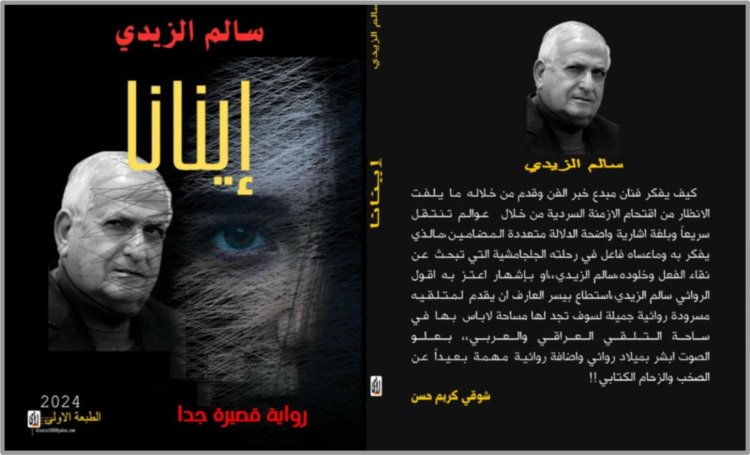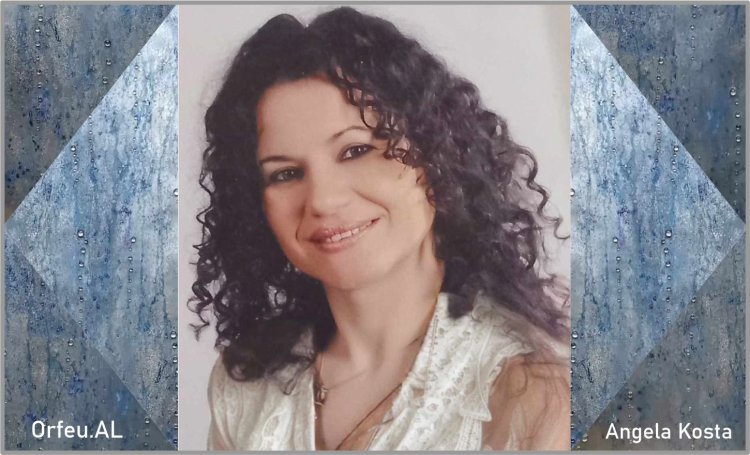By the writer and artist Salem Al-Zaidi
- Worlds of political struggle in the novel (Inana)
- By the writer and artist Salem Al-Zaidi.
Dr. Abbas Al-Jubouri...
The novel is distinguished from other narrative genres by its ability to interact, communicate and adapt to the changing situations and volatile circumstances surrounding humans, so that the short novel throughout its history has been able to achieve accomplishments and leaps that other novels have failed to achieve, in terms of its connection and intertwining with our troubled social reality, as it carries the concerns, issues, emotions and nostalgia of this world, especially those related to political conflicts, social and economic disparities, the degree of stability or lack thereof, and so on, because the size of its space, as well as its unique nature and magical impact, and its characteristics and capabilities in delving into the details of life, enabled the writer Salem Al-Zaidi to involve politics in it by raising real issues, according to which the flaws and negatives are revealed and what is wanted to be revealed, and (Inana) united its creative artistic function with the political function that the writer Salem Al-Zaidi wanted to seek to expand the circle of truth and justice in order to make the individual feel his value in society, and to dust him off, but without being stripped of Its artistic, expressive and aesthetic affiliation to the myth and the return to the beloved land. The artist and writer Salem Al-Zaidi employed the art of the novel in advantages, not limited to being a mere expressive literary genre!! But it succeeded in its interaction and determination in its paths across the ages, and it is not hidden from any of the writers, those interested in literature, and critics, the extent of its response to the challenges of creativity and development.. Professor Salem Al-Zaidi highlighted the image of characterization in the Arab narrative, with his new achievement, whether novelistic or fictional, mythological and expressive in linking the novel with historical turning points full of narration and events, influenced by his Arab intellectual references and his Mesopotamian depth, and the premonitions of Ghassan Kanafani, who are always present on the literary scene, in the very short novel (Inanna) - in a clear, non-shaky or cloudy way, so that researchers or critics can talk about the objective depth in the title of the novel and its contents that bear the name (Inanna) and -Inanna - or Nina - who is the goddess of ancient Mesopotamia associated with love, beauty, desire, fertility, war, justice and political power.. She was originally worshiped in Sumer and was later worshipped by the Akkadians, Babylonians and Assyrians Under the name of Ishtar - she was known as the "Queen of Heaven" and was the goddess of the temple of Ena in the city of Uruk, which was her main cult center. Her husband was the god Dumuzid (later known as Tammuz) ...
The name of the protagonist is associated with an expressive quality, embodying the title (loyal) in a refreshing way in the modern Arabic novel with the image of the political activist or expatriate who has not been changed by the years and events, so that the writer maintains the approach of intellectual purity, influenced by his Arab references, in a clear, comfortable and reassuring image of the presence of the novelistic goal in the literary field itself. When we read this short novelistic text, there was no roughness or danger in the term and studying it according to a complex critical and academic logic, but the writer aimed for clarity and frankness, and even allowing the entry of other factors, components and elements in forming the image we are looking for for the worker in the Arabic novel and story, and this reminds us of the writers Abdul Salam Al-Ujaili and Ghaib Tuma Farman, as well as in the stories of Youssef Al-Sharouni and Hasib Kayali and other Arab writers. The writer Salem Al-Zaidi adopted in modern Arabic narration a path between myth, symbol and modernity to remind us also of the novel that flourished in the forties, then continued to rise and fall in the fifties and sixties of the last century. To the emergence of new relationships that bring together the educated elites in society and to be a fertile and rich material for political, party, cultural and intellectual work, and this cultural and political movement found a translation in the literature written in the same era. To suggest to the reader that there was a kind of human and social solidarity, between the intellectual and political awareness that spread among the educated elites. Where he lures us with his ideas to read his literary achievement to read many poetic, theatrical, novelistic and short story texts from the vastness of his literary experience, as if he is saying (we now have political literature, political criticism, and the politicization of theater) as is the case in the experience of the late Saadallah Wannous in what he sees, and the reader in what he reads. Here in the novel Inanna, literature has become responsible and required to be an image or mirror of the lived reality, and some writers have even been subjected to unprecedented campaigns because of their neglect of reality and what happened to Mukhlis and is happening to others in society, and this is not new what the writer has presented in his masterpieces of writing, to put the Arab writer or intellectual before the test of the ideology he carries in his consciousness and how his intellectual and human beliefs appear within his texts and writings. The images that the writer formed in this novel, that Mukhlis is a victim and a subject of committing injustices at the same time, which is what he focused on with intellectual clarity in the journey in which he embodies to a large extent his autobiography, the hero of the journey of exile in flesh and blood, where he appears Clearly, the human side that ranges between courage and reluctance, cowardice and fear, and the narrator is loyal and almost condemns himself in some situations, and shows the stereotypical human character that can be recognized through a fertile internal world and a tangible external world with clear features and characteristics, and it also presents the character that refers to its counterparts outside the novel, and from here Salem Al-Zaidi presented us with a realistic character in its symbolic form in the full sense of the word and the word through the fictional character with all its dreams and frustrations, and he also presented a hidden epic system, as the character is in a state of constant conflict, and although it does not always emerge victorious from this conflict, the states of anticipation and tension surround it from beginning to end.
عوالم النضال السياسي في رواية ( إينانا) ....
للكاتب الفنان سالم الزيدي.
د.عباس الجبوري ..
تتميز الرواية عن غيرها من الأنواع السردية الأخرى بما لها من قدرات على التفاعل والتواصل والتكيف، مع ما يحيط بالإنسان من أوضاع متغيرة وظروف متقلبة، بحيث أن الرواية القصيرة خلال تاريخها استطاعت أن تحقق انجازات وقفزات عجزت عن تحقيقها غيرها من الروايات، فيما يتعلق بارتباطها وتشابكها مع واقعنا الاجتماعي المتأزم، فهي التي تحمل ما لهذا العالم من هموم وقضايا، وعواطف وحنين ، خاصة تلك المتعلقة بالصراعات السياسية والتفاوت الاجتماعي والاقتصادي، ودرجة الاستقرار وعدمه وغير ذلك، لأن حجم مساحتها وكذا طبيعتها المتفردة ووقعها السحري، وخصائصها وامكانياتها في التعمق ضمن تفصيلات الحياة، مكنت الكاتب سالم الزيدي من إقحام السياسة فيها بطرح قضايا حقيقية، تنكشف بموجبها العيوب والسلبيات وما يراد كشفه ، و( إينانا ) اتحدت وظيفتها الفنية الابداعية مع الوظيفة السياسة التي أراد الكاتب سالم الزيدي السعي الى توسيع دائرة الحق والعدالة من أجل تحسيس الفرد بقيمته في المجتمع، ونفض الغبار عليه، ولكن دون أن تتجرد من انتمائها الفني التعبيري والجمالي للأسطورة والعودة الى الأرضوالحبيبةوظف الفنان الكاتب سالم الزيدي فن الروايةفي مزايا، ليس على انها تقتصر عن كونها مجرد جنس أدبي تعبيري !! ، ولكنها أفلحت في تفاعلها وتحددها في مساراتها عبر الأزمنة، ولا يخفى على أحد من الأدباء والمهتمين بالأدب والنقاد ، مدى استجابتها لتحديات الابداع والتطور ..ابرز الأستاذ سالم الزيدي صورة التشخيص في السرد العربي، بمنجزه الجدبد ، سواء الروائي أو القصصي، الأسطوري والتعبيري في ربط الرواية بمنعطفات تاريخية مرحلية مليئة بالسرد والاحداث متأثراً بمرجعياته الفكرية العربية وعمقه الرافديني ، وارهاصات غسان كنفاني ، يلكون موجوداً دائما على الساحة الأدبية ،في رواية ( إينانا ) - القصيرة جداً- بصورة واضحة وغير رجراجة أو غائمة ، حتى يمكن باستطاعة الباحثين أو النقاد أن يتحدثوا عن العمق الموضوعي في عنونة الرواية ومضامينها التي تحمل إسم ( إينانا ) و -إنانا - أو نينا - وهي إلهة بلاد الرافدين القديمة المرتبطة بالحب والجمال والرغبة والخصوبة والحرب والعدالة والسلطة السياسية.. كانت تعبد في الأصل في سومر وعبدها لاحقًا الأكاديون والبابليون والآشوريون تحت اسم عشتار - كانت تُعرف باسم "ملكة السماء" ربة معبد إينا في مدينة الوركاء، والتي كانت لها مركز عبادة رئيسية. كان زوجها هو الإله دوموزيد (المعروف لاحقًا باسم تموز) ... أقترن اسم بطل الرواية بصفة تعبيرية مجسدا تسمية (مخلص ) بشكل منعش في الرواية العربية الحديثة بصورة المناضل السياسي أو المغترب الذي لم تغيره السنون والاحداث ليحافظ الكاتب على نهج النقاء الفكري متأثراً بمرجعياته العربية ، في صورة صافية ومريحة ومطمئنة لحضور الهدف الروائي في الحقل الأدبي نفسه . عندما تناولنا قراءة هذا النص الروائي القصير ،لم تكن هناك ثمة وعورة أو خطورة المصطلح ودراسته وفق منطق نقدي وأكاديمي معقد بل استهدف الكاتب الوضوح والصراحة ،بل سماح بدخول عوامل ومكونات وعناصر أخرى في تكوين الصورة التي نبحث عنها للعامل في الرواية والقصة العربية ، وهذا يذكرنا بالكتَّاب عبد السلام العجيلي وغائب طعمة فرمان، وكذلك في قصص يوسف الشاروني وحسيب كيالي وغيرهم من الكتاب العرب. انتهج الكاتب سالم الزيدي في السرد العربي الحديث طريقاً بين الأسطورة والرمز والحداثة ليذكينا ايضاً بالرواية التي ازدهرت في الأربعينات، ثم استمرت صعوداً وهبوطاً في الخمسينات والستينات من القرن الماضي . إلى بروز علاقات جديدة تجمع بين النخب المثقفة في المجتمع ولتكون مادة خصبة وثرية من العمل السياسي والحزبي والثقافي والفكري، وقد وجد هذا الحراك الثقافي والسياسي ترجمة له في الأدب المكتوب في الحقبة ذاتها . ليوحي الكاتب الى القاريء كان هناك نوع من التضامن الانساني والاجتماعي ، بين الوعي الفكري والسياسي الذي انتشر بين النخب المثقفة .
حيث يستدرجنا بافكاره لقراءة منجزه الأدبي لقراءة نصوصٍ شعرية ومسرحية وروائية وقصصية كثيرة من شساعة تجربته الأدبية ، وكأنه يقول (بات لدينا أدبٌ سياسي ونقد سياسي، وتسييس المسرح ) كما هو الحال في تجربة الراحل سعد الله ونوس في ما يراه، والقارئ في ما يقرأه .هنا في رواية إينانا ، صار الأدب مسؤولاً ومطالباً بأن يكون صورة أو مرآة للواقع المعيوش، بل إن بعض الكتاب تعرضوا لحملاتٍ غير مسبوقة بسبب إهمالهم للواقع وما حدث لمخلص ويحدث لغيره في المجتمع ، وهذا ليس جديدا ما قدمه الكاتب في روائع كتاباته ، ليضع الكاتب أو المثقف العربي أمام امتحان الأيديولوجيا التي يحملها في وعيه وكيفية ظهور معتقداته الفكرية والانسانية داخل نصوصه وكتاباته .والصور التي شكلها الكاتب في هذه الرواية ، على ان مخلص ضحية وموضع لارتكاب المظالم في الوقت نفسه، وهو ما ركز عليه بوضوح فكري في الرحلة والتي يجسد فيها إلى حد بعيد سيرته الذاتية، بطل رحلة الغربة من لحم ودم، حيث يبرز بوضوح الجانب الإنساني الذي يتراوح بين الإقدام والإحجام، والجبن والخوف، بل إن الراوي مخلص يكاد يدين نفسه في بعض المواقف، ويظهر الشخصية الإنسانية النمطية والتي يمكن التعرف إليها من خلال عالم داخلي خصب وخارجي ملموس واضح المعالم والسمات، كما أنها تقدم الشخصية التي تشير إلى مثيلاتها خارج الرواية، ومن هنا قدم لنا سالم الزيدي شخصية واقعية بشكلها الرمزي بالمعنى الكامل للمفردة والكلمة من خلال الشخصية الروائية بكل احلامها وإحباطاتها، كما قدم أيضاً نسقاً ملحمياً خفياً، فالشخصية في حالة صراع دائم، ورغم أنها لا تخرج دائما منتصرة من هذا الصراع إلا أن حالتي الترقب والتوتر تكتنفها من بدايتها لنهايتها .
Prepared Angela Kosta Executive Director of MIRIADE Magazine, Academic, journalist, writer, poet, essayist, literary critic, editor, translator, promoter



